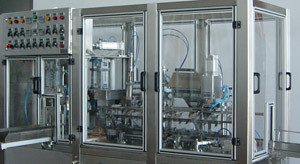In the dynamic landscape of manufacturing, efficiency, precision, and reliability stand as pillars dictating success. Among the myriad innovations enhancing production processes, filling machines emerge as unsung heroes, silently revolutionizing industries spanning beverages, pharmaceuticals, cosmetics, and beyond. These machines, designed with precision engineering, play an instrumental role in ensuring consistency, speed, and accuracy in the filling process.
Unraveling the Essence of Filling Machines
At its core, a filling machine epitomizes the marriage between technology and functionality. These sophisticated machines come in diverse types catering to specific industry needs, such as volumetric fillers, piston fillers, gravity fillers, and more. Each type operates on unique principles, employing advanced mechanisms to precisely dispense liquids, pastes, or powders into containers, bottles, or packaging units.
The Anatomy of Precision
Precision is the hallmark of filling machines. With meticulous calibration and advanced control systems, these machines can accurately measure and dispense substances, ensuring consistent fill levels within fractions of a unit. Whether it’s the precise dosage of medication in pharmaceuticals or maintaining the perfect fill level in beverage bottles, these machines execute with unmatched accuracy, minimizing wastage and optimizing production.
Enhancing Efficiency and Output
In an era where time equates to productivity, filling machines stand as time-saving champions. Their automated functionality streamlines the filling process, significantly reducing manual labor and expediting production timelines. Additionally, their ability to handle a vast array of containers and adapt to different viscosities and densities of substances amplifies their efficiency, making them versatile assets across industries.
Beyond Efficiency: Ensuring Safety and Compliance
Beyond the realm of efficiency, filling machines are integral in upholding stringent safety standards and regulatory compliance. In sectors like pharmaceuticals and food and beverage, where product integrity is paramount, these machines provide a sterile and controlled environment, minimizing contamination risks and ensuring the purity of the filled products. Moreover, they facilitate adherence to regulatory requirements, meticulously measuring and documenting fill volumes and other critical parameters.
Innovation Redefined: Future of Filling Machines
The evolution of technology continues to mold the landscape of filling machines. Integration with IoT (Internet of Things) capabilities, AI-driven predictive maintenance, and enhanced human-machine interfaces are propelling these machines into a new era of smart manufacturing. Real-time monitoring, remote diagnostics, and adaptive control systems are poised to further refine efficiency, reliability, and customization in the filling process.
Closing Thoughts
Filling machines, often working behind the curtains, epitomize the fusion of innovation and practicality in modern manufacturing. Their precision, efficiency, and adherence to quality standards make them indispensable assets across diverse industries. As technology continues to advance, the future of filling machines promises even greater levels of accuracy, adaptability, and seamless integration within automated manufacturing processes.
In essence, the unassuming filling machine represents the vanguard of a manufacturing revolution, where precision meets productivity, ensuring that every drop counts.
